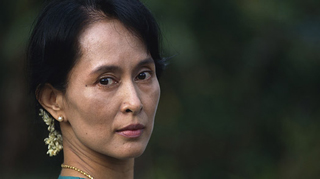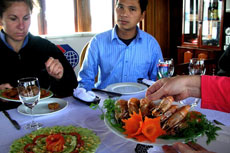Human Flower Project
Sustained by a Father’s Flowers
Aung San Suu Kyi’s signature flowers, reaching back to childhood in Burma, arrived with her in Oslo.

Aung San Suu Kyi
Twenty-one years after it was awarded to her, Aung San Suu Kyi accepted her Nobel Prize for Peace in Oslo, Norway, June 16.
Leader of the Burmese opposition movement, political prisoner, and now a member of Myanmar’s Parliament, she withstood decades of house arrest and separation from her husband and children. Though the government that jailed her permitted her to leave the country and rejoin her family (in the hopes that she would stay away), Aung San Suu Kyi refused, chosing to prolong her own detention rather than abandon the stand for human rights in Burma.
We have taken note since nearly the beginning of Human Flower Project that in public appearances, Aung San Suu Kyi always wears flowers in her hair. She did so at the Nobel Prize convocation today, clusters of white roses pinned beneath her chignon.
But until reading reading Steven Erlanger’s report in The New York Times, we never knew why. “It is a gesture she makes in honor of her father, Gen. Aung San, an independence hero of Burma, who was assassinated in 1947, when she was 2, but whom she remembers threading flowers through her hair.”
Aung San Suu Kyi is welcomes to the Nobel Prize gathering in Oslo by chairman Thorbjorn Jagland.
Photo: Daniel Sannum Lauten/AFP
Here are excerpts from her speech to the Nobel Committee:
“Are we not still guilty, if to a less violent degree, of recklessness, of improvidence with regard to our future and our humanity? War is not the only arena where peace is done to death. Wherever suffering is ignored, there will be the seeds of conflict, for suffering degrades and embitters and enrages.
“A positive aspect of living in isolation was that I had ample time in which to ruminate over the meaning of words and precepts that I had known and accepted all my life. As a Buddhist, I had heard about dukha, generally translated as suffering, since I was a small child. Almost on a daily basis elderly, and sometimes not so elderly, people around me would murmur “dukha, dukha” when they suffered from aches and pains or when they met with some small, annoying mishaps.
“However, it was only during my years of house arrest that I got around to investigating the nature of the six great dukha. These are: to be conceived, to age, to sicken, to die, to be parted from those one loves, to be forced to live in propinquity with those one does not love. I examined each of the six great sufferings, not in a religious context but in the context of our ordinary, everyday lives….
Aung San Suu Kyi, freed after seven years of house arrest, spoke to supporters at the party headquarters of the National League for Democracy, November 14, 2012 in Yangon, Myranmar.
“As you look at me and listen to me, please remember the often repeated truth that one prisoner of conscience is one too many. Those who have not yet been freed, those who have not yet been given access to the benefits of justice in my country number much more than one. Please remember them and do whatever is possible to effect their earliest, unconditional release….
“Absolute peace in our world is an unattainable goal. But it is one towards which we must continue to journey, our eyes fixed on it as a traveller in a desert fixes his eyes on the one guiding star that will lead him to salvation.
Aung San Suu Kyi on the day of her release from house arrest, Nov. 14, 2010, pins on flowers from a supporter
Photo: Associated Press
“Even if we do not achieve perfect peace on earth, because perfect peace is not of this earth, common endeavours to gain peace will unite individuals and nations in trust and friendship and help to make our human community safer and kinder.
“I used the word ‘kinder’ after careful deliberation; I might say the careful deliberation of many years. Of the sweets of adversity, and let me say that these are not numerous, I have found the sweetest, the most precious of all, is the lesson I learnt on the value of kindness. Every kindness I received, small or big, convinced me that there could never be enough of it in our world. To be kind is to respond with sensitivity and human warmth to the hopes and needs of others. Even the briefest touch of kindness can lighten a heavy heart. Kindness can change the lives of people.”

